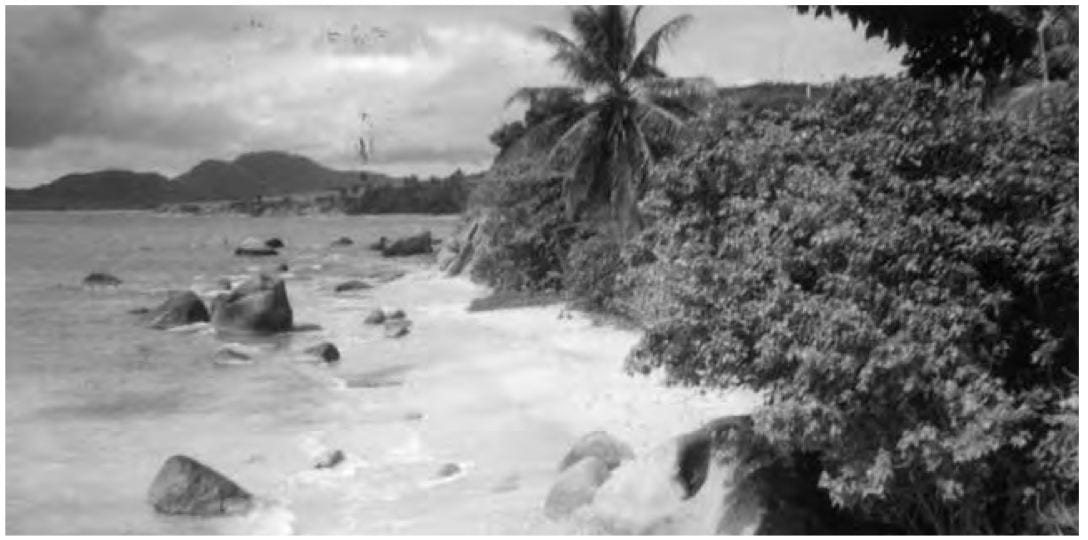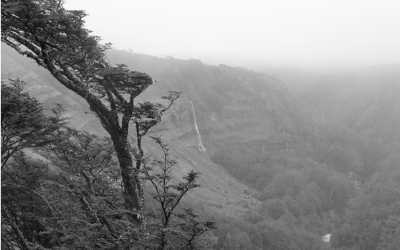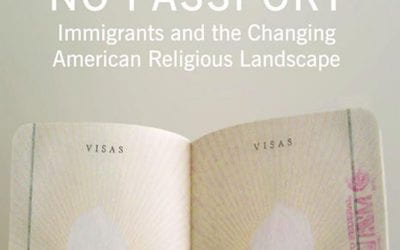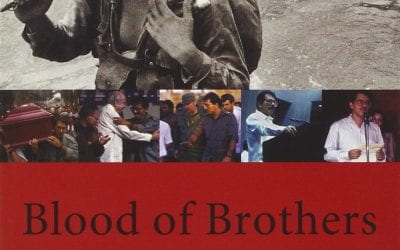The New Politics of Decolonization
The Battle of Vieques
Vieques has been at the frontline of Puerto Rican struggles for decolonization and a key element in the negotiations of the colonial relationship and cititizenship for decades. In the 1940s and 1950s the militarization of Vieques, a Puerto Rico’s island that was used as a U.S.Navy base, was an important component of the negotiation that culminated in the new colonial pact that was juridically consecrated in the establishment of the Commonwealth. It was also, with the neighboring island of Culebra, an important focus of the Puerto Rican new social movements of the sixties and seventies against war, militarism, and colonialism. In the early 1980s, I was part of a vibrant movement in New York City in solidarity with the struggle of the people of Vieques, especially the fishermen. I want to highlight that this was part of a larger movement throughout the United States and that in New York there was a broad-based committee with representation from different sectors of the Puerto Rican community.
Before continuing with the story of Vieques and its importance for the new politics of decolonization, let me situate myself to allow the reader to understand my particular vantage point. I am a Puerto Rican intellectual, in particular a social scientist, who has lived in-between the archipelago of Puerto Rico and the United States for the last 25 years or so. As such, I also self-define as Afro-Latino, and as an activist-intellectual engaged in social movements both in the United States and in Latin America.
I situate myself also to make clear that I am speaking from locations and articulating analyses that differ from what is common sense in the political parties (both from Puerto Rico and the United States). Instead, the angles of vision and analytical perspectives that inform this article are tied to my political and intellectual commitments to a new politics of decolonization embedded and embodied in the theories and practices of rising local, national and transnational social movements.
The question of decolonization goes beyond the often discussed issue of the status of Puerto Rico. Decolonization is more than merely kicking-out an imperial power from the administration of a colonial state, much more than achieving “independence” in the sense of building a “sovereign” nation-state. This in turn supposes and implies a theory of power and social change that could link local, national and global processes, what I call a world-historical perspective on the question of power and agency in the modern/colonial world-system. In this vein, Peruvian sociologist Anibal Quijano coined the concept of the coloniality of power to provide an analytical frame to understand the global pattern of western domination and capitalist exploitation instituted in the 16th century with the so-called discovery of the Americas and the concomitant rise of European imperial hegemony along with the organization of the capitalist world-economy and the emergence of Eurocentric discourses of history, knowledge, culture and identity. A simple way of representing the coloniality of power is as the intersection of four modes of domination: capitalism, racism, imperialism, and patriarchy.
Decolonization is neither an event nor the making of an independent nation-state, but an on-going process of dismantling not only all the forms of imperial domination (political, economic, cultural), but also of challenging and undermining capitalism, racism and patriarchy. For instance, Laura Briggs’ book Reproducing Empire is an exemplary piece of scholarship on the intersection of U.S. imperial power with the production of scientific knowledge in facilitating class racial, and gender domination in 20th century Puerto Rico.
Since the first wave of formal movements for decolonization epitomized by the Haitian revolution and the rest of the 19th century independence wars in the Americas up to the struggles for national liberation in African and the Caribbean in the 1960s, the aftermaths of mere political decolonization have been neo-colonial independence, along with global reconfigurations of the coloniality of power. Since World War II these global restructurings of the coloniality of power had occurred under the command of the U.S. Empire. These imperial-colonial continuities should not deny the historical importance of the formal demise of the old European Empires and the will of liberation enacted by anti-colonial nationalist movements throughout the world which changed not only geo-political landscapes but also the politics of culture and identity at a world scale. However, we need to renew the way that we understand decolonization and its practical implications for a politics of liberation for Puerto Rico and Puerto Ricans. That is why the example of Vieques has such resonance.
But before we go on to the specific case of the battle of Vieques, I would like to argue against the assumption of Puerto Rican exceptionalism. I contend that instead of representing a colonial reality in a postcolonial world, we Puerto Rico and Puerto Ricans embody some of the most visible patterns of the coloniality of power in late modernity. There are many intertwined themes around this issue: the question of citizenship, Puerto Ricans as a diasporic nation, the battle of Vieques, the status question and the current emergence of a new way of doing Puerto Rican politics for example.
Translocal Nation, Transmigration, and Diasporic Citizenship
Since the 1970s Puerto Rican migration turned into a permanent back and forth circular process. For many people it became a condition of dwelling-in-travel, to the extent that a large percentage of the Puerto Rican labor force increasingly began to have fewer options of good employment on either shore. As the forms of travel, communication and exchange between the archipelago and Puerto Rican communities in the United States diversified and intensified, Puerto Rican individuals, families, political parties, social movements, and institutions in general composed tied networks between the islands and the mainland. This dispersion of the Puerto Rican population and the resulting multiplication of the spaces of Puerto Rican life in the United States had reterritorialized the geography of the Puerto Rican nation beyond the Caribbean archipelago, and therefore the inclusion of Puerto Ricans in the U.S. mainland. Part of what is implicit in this argument is that in light of colonialism, including the possession of colonial citizenship, Puerto Ricans had been massively displaced and relocated, first mostly to world cities like New York and Chicago and eventually across the United States. To the extent that we self-identify as a distinct people and that we are identified as “other” (non-American/non-white) by U.S. governmental, corporate, intellectual, and public cultures; and in so far as colonial difference colors our collective condition, we continue being Puerto Rican nationals in spite of being U.S. citizens. This promotes a sort of “double consciousness” (for a concept of double conciousness, see W.E.B. Du Bois) in which most Puerto Ricans identify culturally as Boricua at the same time that prefer to maintain the benefits of U.S citizenship in terms of entitlements, rights and mobility. Colonial citizenship is ambiguous: on the one hand, it is a form of subordination that legitimizes U.S. hegemony; on the other hand, it constitutes a framework for extending the franchise and obtaining rights and resources from the metropolitan state.
The relative nomadism that characterizes the lives of many Puerto Ricans from cosmopolitan intellectuals to seasonal workers (some in world cities, others in agribusiness) makes the actual practices of citizenship a multilayered process of negotiation and adjustment.
For instance, the movement for a Puerto Rican/Latino mayor in New York can be described as a struggle for the right to the city from its urban citizens. On the other hand, a U.S. national campaign against the U.S. navy in Vieques, led by the National Puerto Rican Coalition, reveals in its very definition a double meaning for the signifier “national” and the practical political implications of a U.S. citizenship that could be at once a forms of imperial subjugation and a resource of anti-imperial resistance. The question of Latinidad itself reveals some of the paradoxes of Puerto Rican colonial citizenship and hybrid identity as we often are labeled as Latinos in the U.S., while frequently been stigmatized as “Americans” in Latin America. Once again, the social movement for peace, justice, and sustainable development in Vieques can be partly defined as a local and national plea for human rights as well as a way of seeking with global civil society and a claim for global citizenship.
Over the years, the issue of Vieques has coalesced with the support of a diverse group of activists, ranging from elected officials such as Gilberto Gerena Valentin (also the organizer of the first Puerto Rican Day Parade) and community-labor leader Jose Rivera who in the 1990s as a Councilman introduced a resolution that was approved in the New York City Council against the U.S. Navy bombings in Vieques. The long Battle of Vieques exemplifies the meaning of citizenship as an arena of struggles in which social movements are the most dynamic elements pushing for the extension of the franchise, the amplification of the types and claims of rights, and the concrete content and practices of citizenship.
Especially after the 1999 assassination of David Sanes, the Vieques movement is now a multifaceted one that integrates ecological, health, labor, women, peace, anti-militaristic and anti-imperialist, and popular-democratic dimensions with their respective claims. Its broad-based character and its ability at some particular junctures to convene an overwhelming level of support among Puerto Ricans everywhere, constitutes it as one of these unique movements and peculiar moments in which a colonial nation closes ranks against an empire, in spite of the enormous differences (class, gender, race, ideological, etc) in debate and conflict within the “imagined community.”
The Vieques struggle is not necessarily or primarily for political independence, but it has significant anti-imperial elements and counter-colonial effects, because its immediate target for a long time was one of the largest U.S. military complexes in the world, and because it clearly shows the despotic face of the colonial power of the metropolitan state not only over Puerto Rican colonial citizens but also over the insular colonial state.
Along with many others from both the archipelago and the mainland, the Puerto Rican representatives in the U.S. Congress ,Luis Gutierrez, Nydia Velazquez and Jose Serrano,—our only representatives given the territorial limitations of our second class citizenship— clearly argued that the abuses of the U.S. Navy in Vieques are executed against U.S. citizens. In this light, Vieques can once again demonstrate the ambiguities of modern citizenship and the dialectics of colonial citizenship.
From the standpoint of the rather small Puerto Rican independence movement, the victory for the Vieques movement (and for the global movements for peace and justice) that represented the retirement of the U.S. Navy from the occupation of two-thirds of the island in May 2003, was largely taken as an important step in the struggle for self-determination and in the building of a formally sovereign nation-state with its own legal citizenship. However, from the perspective of the majority of Puerto Ricans who supported (many of whom still support) the cause of Vieques, the movement translates into claims for rights to peace, health, ecological harmony and democratic control over their local affairs.
But Vieques can also reveal the limits of the politics of rights and of colonial citizenship itself. Claiming rights as U.S. citizens also means fulfilling duties such as participarting in wars and contributing to building the strongest military complex in human history and that’s one of the claims of the U.S. Navy. After September 11th, 2001, the imperial imperative of security and militaristic patriotism affected the course of the battle of Vieques. In fact, an important question that has been highlighted since then is, how the anti-terrorist laws and the on-going dismantling of the metropolitan welfare state with the resulting assault on civil liberties and erosion of the social wage, can transform the actual content of U.S. citizenship and particularly how will it affect colonial citizenship.
Another way of putting it is, what are the implications for Puerto Rican colonial citizenship of the escalating erosion of U.S. liberal democracy, and the rise of the extra-legal authoritarian “state of exception” as the legal and political norm, as manifest in the Abu Ghraib tortures and the illegral incarcerations accompanied with gross violations of human rights in Guantanamo? In short, Vieques can serve as a yardstick to evaluate both the limits and possibilities of liberal colonial citizenship as well as the seamy side of U.S. democracy, its institutions and practices of coercion and surveillance, and its militarism.
Even today, after the U.S. Navy is officially out of site, the metropolitan state and U.S. capital still have much of the power to call the shots on the possibilities to fulfill the four Ds (demilitarization, decontamitation, devolution of land and sustainable development) that summarize the current demands of the social movement in Vieques. This is the ultimate proof of the form and content of colonial or second class citizenship. In spite of a powerful broad-based movement with widespread global support including in some sectors of power in the U.S. the resolution of the Vieques problem (to call it that way) is not certain and the only engine of democratization and decolonization is the movement itself.
Political groupings and grassroots organizations in Puerto Rican neighborhoods across the mainland have taken Vieques as a primary concern and this shows the translocal character of some significant social movements in the Puerto Rican diasporic nation. I contend that the radical democratic ethos of some of these social movements bear the main promise for the democratization of U.S. citizenship and the decolonization of Puerto Rican life.
In light of its level of popular support, multifaceted character, and global appeal, the struggle for peace and justice in Vieques had been embraced by many other movements across the U.S. and throughout the world. As Francois Houtart claims in an article on the new wave of social movements against capitalist neo-liberal organization and the new imperialism, Vieques is perhaps the only victory of antisystemic movements against U.S militarism. The appeal to ecology, health, peace, and local democracy as human rights and the struggle against militarism and repression makes the movement for Vieques one of regional and global concern. In so far as there is an increasing globalization of claims of rights and the terrains for democratic struggles, as exemplified in the anti-globalization movements, the question of citizenship in the context of Vieques is also part of a larger struggle for global justice, rights, and citizenship, of what we can call global decolonization.
In these neoliberal times in which the role of the citizen had been partly reduced to be a consumer and a passive elector, and politics to a mass-mediated spectacle, movements like the one in Vieques represent the promise of the democratization and decolonization of citizenship.
Spring 2008, Volume VII, Number 3
Agustin Lao-Montes is an assistant professor in the Department of Sociology and the Center for Latin American, Caribbean, and Latino Studies at the University of Massachusetts at Amherst. He was a Fulbright Fellow at Columbia University as Fulbright Fellow during the 2007-08 academic year.
Related Articles
Editor’s Letter: Puerto Rico
Long, long ago before I ever saw the skyscrapers of Caracas, long before I ever fished for cachama in Barinas with Pedro and Aída, long before I ever dreamed of ReVista, let alone an issue on Venezuela, I heard a song.
God Needs No Passport
For a practicing Buddhist, my first Mass attendance at St. Ambrose two years ago was a memorable event. I had spent the earlier part of the day visiting…
Blood of Brothers: Life and War in Nicaragua
Stephen Kinzer, New York Times Bureau Chief in Nicaragua for most of the war years, pauses in his compelling account of the war and its politics to explain the Socratic method needed to give…





